Donkeys evolved to fill a very different ecological niche than horses. Whereas horses evolved to survive and thrive in open, grassland plains, donkeys adapted to much drier, arid environments, such as the African deserts. With this in mind, we need to consider how we can meet donkeys’ environmental needs, in habitats such as temperate climates (like the climate we have in the UK).
Mules and hinnies are hybrids between horses and donkeys. This means that they get half of their genes from horses and the other half from donkeys. They can show large individual differences in conformation and behaviour and often require a highly individual approach to management and handling.
The wetter climate of the UK can predispose donkeys to a range of health conditions because they are poorly adapted to the environmental conditions. This includes white line disease, obesity, laminitis and hyperlipaemia.
So, how can donkey owners and keepers provide donkeys with a suitable environment?
Provide friends
Donkeys require companionship and usually form strong bonds with one other donkey. They can live in small groups. Mules and hinnies have an equally strong need for social companionship as horses and donkeys, but may differ in their social preferences. There is some limited research to suggest that they prefer the company of their dam’s species, i.e. mules may prefer horses while hinnies may prefer donkeys. For more information, please see our Donkey and mule behaviour essentials advice page.
Provide suitable forage and browse
Donkeys did not evolve to eat sugar rich grasses, but high fibre forage and browse instead. Donkeys should be provided with straw and safe tree/shrub branches e.g., willow and hazel. Mules and hinnies can often be good-doers and may need a more restricted calorie intake than horses of a similar size. You can find more information on feeding donkeys, mules and hinnies on our Donkey and mule nutrition essentials advice page.
Provide plenty of dry, grass-free areas
Donkeys evolved to survive in arid, desert conditions, not lush green fields. Donkeys should be provided with large dry lots and/or areas of hardstanding. Not only does this help support good hoof health, but where necessary can be a means of reducing their grass intake to help with weight management. Mules and hinnies may need more space to roam than donkeys, but with similar access to dry areas of hardstanding.
Provide plenty of shelter
Donkey’s coats are not waterproof; therefore, they should be provided with man-made shelters and ideally, plenty of natural (safe trees and hedges) so that they can avoid wet weather. Rugs may be suitable for donkeys, mules and hinnies, but over-rugging (applying a rug that is too heavy for the conditions) should be avoided.
Provide species appropriate enrichment
Enrichment should stimulate the donkeys’, mules’ and hinnies’ natural behaviours and senses. This can include providing forage and browse in interactive, interesting ways, use of different scents (e.g., safe plants and essential oils) and providing different surfaces (e.g., bark or sand). Both donkeys, mules and hinnies benefit from exploring new environments in a calm and safe way, as well as from training that stimulates their problem-solving skills.
Our international team works with donkeys in different environments all over the world, including Senegal. You may think that the environment in Senegal would be perfect for donkeys, but due to recent prolonged drought their environment is changing. To find out more, please watch our short documentary exploring how donkey keepers are changing their practices to cope with the changing environment.
Popular advice in Environment

Pasture management for horse paddocks
Find out how to manage your paddock for the health of your horse, pasture and soil.

Winter horse care tips
Read our advice on how to care for your horse during winter, including our top ten tips on winter horse care.
Other advice categories
All webinar categories:
Call our Advice Line
+44 (0)1953 497 238Not found the advice you were looking for? Our friendly team of horse care experts offer free practical advice. What can we help you with today? Our advice line is available 8.30am-5:00pm, or you can email education@worldhorsewelfare.org.


